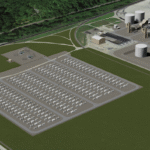Maximizing Grid Efficiency: Tips for Utilities and Consumers
Introduction
Grid efficiency has become a pressing concern in the energy industry, with utilities and consumers alike looking for ways to reduce energy waste and lower costs. In this article, we’ll explore the importance of grid efficiency, the current state of the industry, and provide actionable tips for utilities and consumers to maximize their grid efficiency.
The Importance of Grid Efficiency
Grid efficiency is the measure of how effectively the power grid distributes and consumes electricity. A more efficient grid can reduce energy waste, lower costs, and increase the overall reliability of the power supply. With the increasing demand for renewable energy, grid efficiency has become more critical than ever.
Challenges in the Current Grid
The current grid faces several challenges that hinder its efficiency, including:
* Aging infrastructure: Many power plants and transmission lines are outdated and in need of replacement.
* Distributed energy resources: The increasing adoption of solar and wind power has created new challenges for grid management.
* Peak demand: The demand for electricity is highest during peak hours, which can strain the grid and lead to power outages.
Maximizing Grid Efficiency for Utilities
Utilities play a critical role in maximizing grid efficiency. Here are some tips for utilities to improve their grid efficiency:
Implement Advanced Grid Management Systems
Advanced grid management systems can help utilities optimize energy distribution, detect and prevent power outages, and manage peak demand.
Invest in Energy Storage
Energy storage solutions can help utilities store excess energy generated from renewable sources and release it when needed, reducing the strain on the grid during peak hours.
Implement Demand Response Programs
Demand response programs can help utilities manage peak demand by incentivizing customers to reduce their energy consumption during peak hours.
Maximizing Grid Efficiency for Consumers
Consumers also play a crucial role in maximizing grid efficiency. Here are some tips for consumers to reduce their energy consumption and contribute to a more efficient grid:
Switch to Energy-Efficient Appliances
Energy-efficient appliances can help consumers reduce their energy consumption and lower their energy bills.
Adjust Your Thermostat
Adjusting your thermostat can help consumers reduce their energy consumption during peak hours and contribute to a more efficient grid.
Use Energy-Efficient Lighting
Energy-efficient lighting can help consumers reduce their energy consumption and contribute to a more efficient grid.
Conclusion
Maximizing grid efficiency requires a collaborative effort from both utilities and consumers. By implementing advanced grid management systems, investing in energy storage, and implementing demand response programs, utilities can reduce energy waste and lower costs. Consumers can also play a crucial role by switching to energy-efficient appliances, adjusting their thermostat, and using energy-efficient lighting. By working together, we can create a more efficient and sustainable energy grid for the future.
FAQs
What is grid efficiency?
Grid efficiency is the measure of how effectively the power grid distributes and consumes electricity.
Why is grid efficiency important?
Grid efficiency is important because it can reduce energy waste, lower costs, and increase the overall reliability of the power supply.
How can utilities maximize grid efficiency?
Utilities can maximize grid efficiency by implementing advanced grid management systems, investing in energy storage, and implementing demand response programs.
How can consumers maximize grid efficiency?
Consumers can maximize grid efficiency by switching to energy-efficient appliances, adjusting their thermostat, and using energy-efficient lighting.

.png?w=150&resize=150,150&ssl=1)
.png?w=150&resize=150,150&ssl=1)



.png?w=150&resize=150,150&ssl=1)